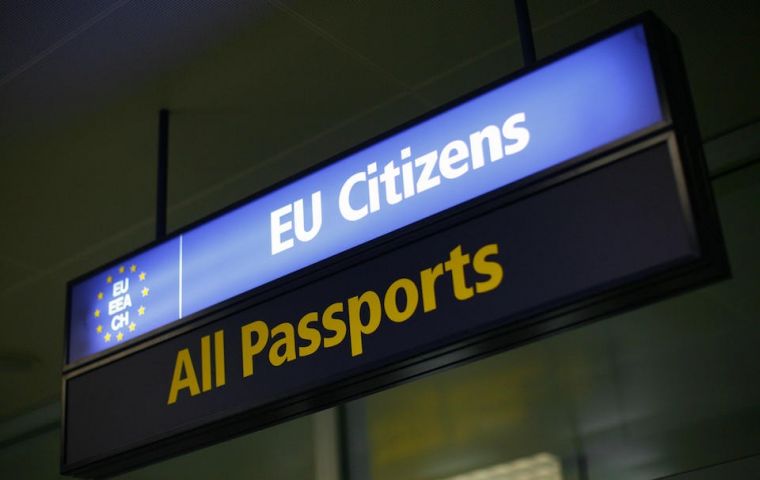MercoPress. South Atlantic News Agency
Mercosur nationals will need a visa to enter Schengen area
 The ETIAS visa will be required even for stopovers
The ETIAS visa will be required even for stopovers Nationals of 15 Latin American countries -including all members of Mercosur- and of 60 countries worldwide will need to apply for a European Travel Information and Authorization System (ETIAS) visa to travel to or through the 26 territories within the so-called Schengen area, effective in 2023.
The document will be required for foreign nationals to enter Germany, Austria, Belgium, Denmark, Slovakia, Slovenia, Spain, Estonia, Finland, France, Greece, Hungary, Italy, Latvia, Lithuania, Luxembourg, Malta, Netherlands, Poland, Portugal, Czech Republic, and Sweden, in addition to non-Schengen Iceland, Liechtenstein, Norway, and Switzerland as well as Monaco, San Marino, and the Vatican.
The ETIAS visa procedure is fully online. Applicants will need a valid passport, a debit or credit card to pay the 7-euro application fee (which does not apply to people under 18), proof of criminal record (or lack thereof), and an e-mail address. ETIAS visas will be valid for 3 years but will be canceled if the applicant's passport expires before, whichever happens first.
Travelers will also be required to state where they will be staying and answer questions regarding public health risks, among others.
ETIAS will allow authorities to make a pre-selection of persons who may or may not enter the continent prior to their arrival in one of the member countries. The ETIAS system is a risk control and prevention measure for travelers seeking to enter the Schengen area. To this end, travelers will be monitored and their data will be checked against the Europol and Interpol databases in order to avoid future threats.
Requests will be processed online. Those granted approval will be allowed to stay for up to 90 days at their destination.
The ETIAS requirement was approved last July by the European Parliament as Schengen countries abolished internal border controls. Some European Union countries such as Croatia, Cyprus, Romania, Bulgaria, and Ireland are not part of the agreement and have other visa requirements.
To obtain the permit, the applicant, who must have a valid passport, an e-mail address, and a debit or credit card, will have to fill in some personal information, including educational background, occupation, health history, and whether they have any family members in Europe, the first EU country they plan to visit, and a security questionnaire. In the case of minors, the legal guardian must be responsible for the travel authorization application. The data included in the application will be cross-checked with databases of the European Union (Europol), the Schengen Area (Schengen Information System (SIS), the Visa Information System (VIS), and Interpol.
Authorities believe around 95% of applicants can expect an automatic approval that will be sent to them by e-mail within a few minutes. Of the remaining 5%, 3-4% will be approved after a more exhaustive process, and 1% will be rejected. In case of doubts, applications will be processed manually might take between 96 hours and a maximum of 2 weeks to reach a decision.
The ETIAS travel permit in no case replaces the visa required for those who wish to live, work, study or stay for periods longer than 90 days in Europe, who must apply for the corresponding visa at the consulate or embassy of the country of destination.
The new regulation, which establishes additional controls for citizens of almost 60 countries that do not require visas, including the United States, was approved by the European Parliament with 494 votes in favor, 115 against, and 30 abstentions.




Top Comments
Disclaimer & comment rulesCommenting for this story is now closed.
If you have a Facebook account, become a fan and comment on our Facebook Page!